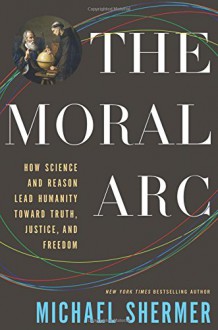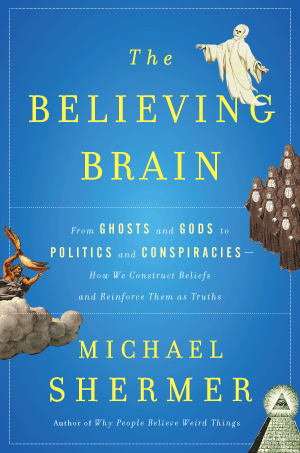 This book tries to fill in some of the whys in Steven Pinker's book "Better Angels of our Nature: Why Violence has Declined". The author starts off by defining morality as the "flourishing and surviving of sentient beings". It's not a perfect definition but in general the listener can latch on to it.
This book tries to fill in some of the whys in Steven Pinker's book "Better Angels of our Nature: Why Violence has Declined". The author starts off by defining morality as the "flourishing and surviving of sentient beings". It's not a perfect definition but in general the listener can latch on to it.The author does go beyond Pinker's book and tries to fill in more of the reasons why violence has declined by looking at the facts from a morality point of view. Shermer knows it is more profitable to realize that man is the measure of all things and that our values are not etched in stone and aren't externally given to people, but are derived by people.
The continuous contextual approach (inductive) is almost always better than a binary, absolute approach (deductive). Using reason, science and observation can make us understand and appreciate the flourishing and surviving of others who aren't necessarily in our tribal group, be it kin, friend, community, or other self selected but always exclusionary group which divides 'us' from 'them' in some manner and leads to the widening of our moral sphere.
He looks at how our moral sphere is constantly becoming more inclusive. Slavery is the ultimate us against them. The realization of the wrongness of slavery and its abolition was a slow continuous process. For those who derive their values from external sources, the revealed religion sources just get it wrong on slavery. He considers in detail the widening of the moral sphere for less misogynistic attitudes towards women, the slow process of no longer making gays the other and even considers some of the issues in speciesism (the author is a specieist, as I am too, but I understand the issues).
It's hard for me not to fully embrace a book were I admire an author as much as I admire Michael Shermer, I read his articles frequently, I love his debates on the internet, he quotes accurately from Gene Rodenberry and Star Trek, he seems to love the same episodes of Twilight Zone that I do, and he quotes Michio Kaku extensively and other such things that I love too.
But, he doesn't stick to the narrative and falls off the track. For example, I am not sure why he uses Piketty and his "Capital in the 21st Century" to try to refute Piketty's own thesis. Inequalities are real in the world (and within America) and have been getting worse. He seems to think corporations aren't a threat to moral development and represent moral good. For me, corporations are not people, and can be a force of bad. He had a lot of things like that in this book which only gets in the way of his own thesis.
It's a minor thing, but I can't help myself. The author says "Alan Turing is agruably the most important man for the Allied's victory in WW II". Alan Turing is a hero of mine, but I don't think that statement is defensible. Betchley Park was a cooperative, and the Polish Mathematicians (God Bless the Poles!), cracked the enigma code first. For a marvelous audible book on the subject read, "Seizing the Enigma". Also, he states "most people agree that for WW I both sides are to blame". I would strongly recommend Max Hasting's recent book, "Catastrophe 1914" for a refutation of that statement.
I would say, Pinker's book, "Better Angels of our Nature" is my favorite book. It opened my eyes to how the world has improved since the dawn of time and how our moral sphere keeps getting wider (less of us against them and more of us). Most of what is good in Shermer's book is in Pinker's book. I realize Pinker's book is very technical. This book is not. Even though the author does ramble (much like this book review!), this book is a fine substitute for Pinker's book for those who don't love sets of tables, long historical reviews, an author who keeps on his narrative and summaries of scientific papers.

 Log in with Facebook
Log in with Facebook 

 did something influence them? The behavior of others perhaps? Also, they will take a product from the same place. There could be five rows of this product, yet everyone will take from the same row. Now, while I am speaking of very small matters I can tie these into larger matters, such as the political or religious beliefs of people and ask the same questions. Which is why Michael Shermer’s book The Believing Brain: From Ghost and Gods to Politics and Conspiracies - How We Construct Our Beliefs and Reinforce Them as Truths was of interest to me.
did something influence them? The behavior of others perhaps? Also, they will take a product from the same place. There could be five rows of this product, yet everyone will take from the same row. Now, while I am speaking of very small matters I can tie these into larger matters, such as the political or religious beliefs of people and ask the same questions. Which is why Michael Shermer’s book The Believing Brain: From Ghost and Gods to Politics and Conspiracies - How We Construct Our Beliefs and Reinforce Them as Truths was of interest to me.






